
A new film, by Turbanology filmmaker Jay Singh-Sohal, discusses the presence of Sikhs in the World Wars. Sikhs at War is a free online educational short-film exploring one young person’s journey to discover the invaluable contribution made by his community during the First World War. This documentary has been made specifically with young people in mind. Educators can use the film as a resource to find out more about Sikhs who fought during both World Wars for Great Britain.
From their simple village life in the Panjab regions of modern day India and Pakistan, the Sikhs volunteered in their thousands to fight for Britain. During the Great War their numbers rose from 35,000 at the beginning of 1915 after the crisis in Europe turned into War, to more than 100,000 who were in active service by the time it ended in 1918.
The Sikhs formed 20% of the British Indian Army in action despite being only 2% of the population of India. They fought on all fronts in Europe, from Turkey and in Africa to the fields of Flanders. Their bravery is legendary – of the 22 Military Crosses awarded for conspicuous gallantry to Indians during the conflict 14 were rewarded to Sikh soldiers.
But for the thousands that left their homelands to join the fighting many did not return. During both the Great War (1914-18) and World War Two (1939-45) Sikh soldiers killed in action numbered 83,005 with 109,045 more wounded. One again despite being a minority in British India.
It can be said that extraordinary history is currently being made in the UK’s political environment. A possible Conservative-Liberal parliament is in the works – but the question remains – who will decide it? An interesting article in the Guardian discusses the need for a more diverse government to be formed.
The headline results are already solidly familiar. But it is the analysis of who voted where, and who they voted for, that will best illustrate the wider political health of the nation. Already, it is clear that once again the House of Commons is too white and too male and too middle class to reflect the people who voted for it. [link]
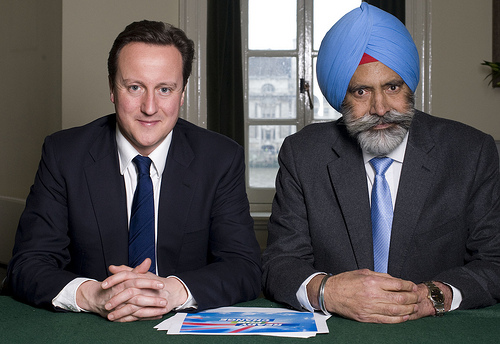 There were a number of South Asian candidates who were hoping for seats in parliament. Gurcharan Singh was one such candidate (hat tip: Southall Lad). As the first turban wearing mayor of Ealing, Gurcharan stood as the Parliamentary Candidate for the Conservatives in Ealing Southall – a Labour stronghold for many years. The following is a message from the candidate,
There were a number of South Asian candidates who were hoping for seats in parliament. Gurcharan Singh was one such candidate (hat tip: Southall Lad). As the first turban wearing mayor of Ealing, Gurcharan stood as the Parliamentary Candidate for the Conservatives in Ealing Southall – a Labour stronghold for many years. The following is a message from the candidate,
If elected, I will make sure that I represent the concerns and interests of all communities. This will include visiting local Mosques, Mandirs, Churches and Gurdwaras. I would like to set up an inter-faith working group to ensure that we can tackle local issues together and in a unified manner. I believe that the issues we face cut across us all. For example, we all care about the NHS, we all care about the safety of our families, we all want to be able to express our religious freedoms without hindrance and we all care about education. Therefore, we should tackle these issues together. [link]
A true Sikh hero, Fauja Singh, turned 99 last Thursday.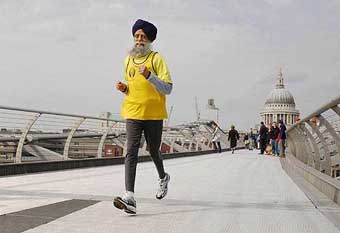
Turbaned Tornado, Fauja Singh turns 99 on Thursday. Here’s wishing this Punjabi icon who manages running marathons at an age not many reach, many happy returns of the day. Besides other gifts that he’d be receiving on his birthday on April 1, this real life ‘Forest Gump’ is all set to give himself a present — by setting yet another marathon record at the ripe age of 99. “I can only sleep, run or walk. I’ll die the day I sit down,” the young nonagenarian had told this scribe in an interview in 2005 on the streets of Ilford, Essex, UK, where he has been living along with his son Sukhjinder Singh since the 1980s. He shifted to UK after having lost his wife and younger son in quick succession in Punjab. [TOI]
Guest blogged by Harbakhsh Grewal
At the start of this year BBC 1, Britain’s premiere tv channel, highlighted the importance of 1984 to the Sikh psyche with a film documenting the personal journey of a British Sikh woman, journalist Sonia Deol. The reaction from many Sikhs has been hostile and vocal. Did the programme insult the faith, demonise its leaders and miss a massive opportunity to set the record straight as some have claimed? And even if it did, does the presenter deserve the vitriolic response resulting in her deleting her facebook page to avoid any more abuse?
Whatever the rights and wrongs of the programme, the response to it shows the level of concern still in the community to the tragic and horrific events of 1984. However some of the criticism has been purely personal and deeply unpleasant and does nothing to redress the balance or aid the causes that those who are angry care about.
To discuss the programme in any detail requires much deliberation. And that in a sense is why the programme should be applauded: the issues covered were of such enormity and complexity the programme makers should be congratulated for daring to cover them at all in the first place – and to try and do so within an hour slot is a task of great difficulty.
And the fact that many younger Sikhs, as well as the wider non-Sikh public more generally, have discovered a whole chapter of their own community’s history in some depth and breadth I think shows that the BBC has provided a much needed service.
Those who criticise on specific issues such as the portrayal of Bhindranwale have their own points to make. But they seem at times illogical.
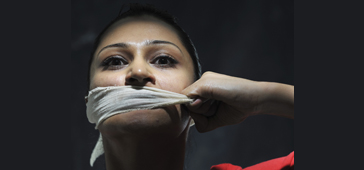 Many of you will recall the protests which emerged in 2004 when Gurpreet Kaur Bhatti went to stage her second play, Behzti. The play, which covered issues such as rape and violence within the setting of a gurdwara, caused an uproar in the Sikh community in Birmingham and was later canceled. Many community members welcomed the decision to cancel the play, while others argued that limiting the playwright’s free speech was actually detrimental to the Sikh community. It was nicely put in a Guardian article stating that, “The dispute became a classic conflict between the artist’s right to freedom of expression and a community’s wish to have their faith treated with dignity.”
Many of you will recall the protests which emerged in 2004 when Gurpreet Kaur Bhatti went to stage her second play, Behzti. The play, which covered issues such as rape and violence within the setting of a gurdwara, caused an uproar in the Sikh community in Birmingham and was later canceled. Many community members welcomed the decision to cancel the play, while others argued that limiting the playwright’s free speech was actually detrimental to the Sikh community. It was nicely put in a Guardian article stating that, “The dispute became a classic conflict between the artist’s right to freedom of expression and a community’s wish to have their faith treated with dignity.”
The Rep had taken the unusual step of inviting Sikh community leaders to a private preview to air their concerns, after which they agreed not to oppose the play if the setting was moved to a community centre. Bhatti refused. “I wanted to write a play about religious hypocrisy,” she explains, “for which the setting in a gurdwara was non-negotiable. The attempt to establish a dialogue with the Sikh community was well intentioned, but ultimately misinterpreted as an invitation to rewrite my play.” [link]
Gurpreet Kaur Bhatti later found a card among her Christmas mail that read: “Seasons Greetings. This will be your last Christmas. You are a disgrace to the race. Sending you lots of hate.” Bhatti was forced to go into hiding. Behzti sparked protests and death threats, and now the playwright is attempting to address the controversy in her new play, Behud – which translates colloquially as “beyond belief”.
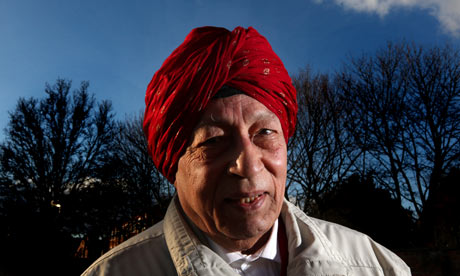 In some way I know I shouldn’t even be writing this. I am giving an idiot the fame that he seeks, but doesn’t deserve. Oh well, here we go.
In some way I know I shouldn’t even be writing this. I am giving an idiot the fame that he seeks, but doesn’t deserve. Oh well, here we go.
So Rajinder Singh is an idiot. Rajinder Singh wants to be the first non-white to join the British National Party (BNP) in the UK. To those from elsewhere, the BNP is similar to the KKK, without the sheets and ropes. For years they had limited (if that’s the right word) their membership to people of “Caucasian origin.” The Equality and Human Rights Commission had threatened them with a court injunction if they did not open up their ranks.
Playing on the issue of anti-immigration and Muslimophobia, the fast blinkers (read conservatives) are making some noise in the wake of the economic downturn. However, due to a court ruling and a willing lackey, it seems the BNP is about to gain Rajinder.
For the cameras, Rajinder has decided to label himself a Sikh and wear a turban.
Singh – admits he’s only wearing it for my ¬ benefit. He’s not a religious man and is clean shaven, but he wore a turban the first time he ever had “media exposure” – on BNPTV, the party’s online ¬channel – and has decided to do so whenever speaking to the media because “the message carries more weight” coming from a turban-wearing Sikh.[link]
My question – does wearing a turban give him more ‘weight’ amongst Sikhs or non-Sikhs?
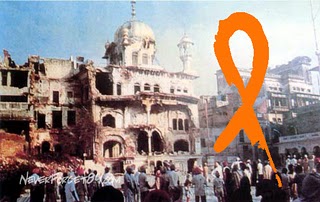 Guestblogged by Joo Kay Singh
Guestblogged by Joo Kay Singh
I’ve just spent the past hour watching 1984: A Sikh Story on BBC1 in the UK, and came away mildly disappointed, but not altogether surprised.
The documentary was framed as a “personal journey” for the presenter, Sonia Deol, to “unravel the events of 1984, an iconic year for Sikhs”, and informs us that “the bloody aftermath that followed [of Indira Gandhi’s assassination] so shocks Sonia that she is forced to reappraise the depth of her commitment to her faith”
For the first part of the program, we were served up with interviews mainly with Mark Tully and K.S. Brar who sounded like they were both regurgitating paragraphs from their respective books on the subject on the background to the Invasion. Sant Jarnail Singh was given the usual ‘congress stooge turned bad’ treatment by both, and the Darbar Sahib invasion covered without a hint of investigative journalism. Sonia failed to enquire why 37 other gurdwaras were attacked on the same day, if as per Tully and Brar’s insistence, Indira Gandhi was merely interested in Sant Bhindrawale. She similarly fails to question either of the men on the timing of the attack, on why the entire state of Panjab was placed under curfew, the expulsion of all foreign media, or the killings of pilgrims by the Army.
For our TLH readers in the UK – this documentary is premiering tonight on BBC One at 10:55pm.
Just over 25 years ago, the storming of The Golden Temple, the most sacred of Sikh shrines, by the Indian Army led to protests around the world. Sonia Deol embarks on a personal journey to unravel the events of 1984, an iconic year for Sikhs. It culminated in thousands of deaths including the assassination of the Prime Minister, Mrs Indira Gandhi. The bloody aftermath that followed so shocks Sonia that she is forced to reappraise the depth of her commitment to her faith. [link]
As with every retelling of this part of history, the question is whether the documentary will be controversial. One article suggests the BBC may be stirring up a “hornet’s nest of controversy,”
[It] is likely to prove controversial with some Sikh groups because of its portrayal of the militant Sikh preacher Sant Jarnail Singh Bhindranwale. It is also likely to draw the ire of the Indian government for its story on how it reacted following the assassination of Indira Gandhi. [link]
Nevertheless, this is an event that has often been ignored in international media – so i’m sure many in the community will welcome the coverage. If any of TLH readers do happen to catch the show tonight, please share your thoughts!
This time, Bollywood actually picked an interesting lens through which to depict life in a Punjabi-Sikh household. An 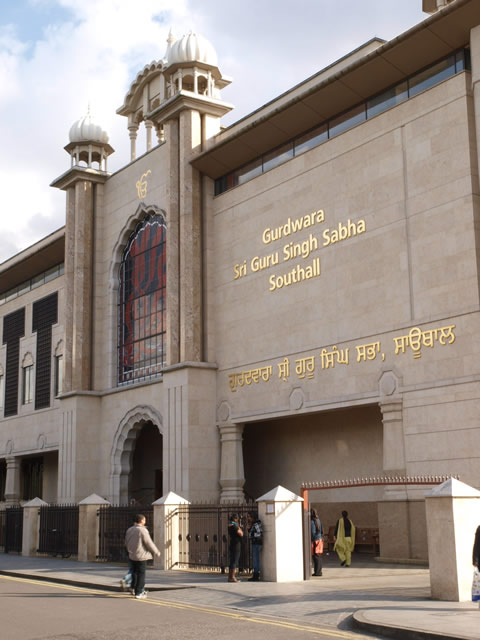 upcoming movie, Patiala House, is a look at cross-generation cultural assimilation in Southall.
upcoming movie, Patiala House, is a look at cross-generation cultural assimilation in Southall.
At heart, says Nikhil, Patiala House is a father-son story. “Like Billy Eliott where the father is a coal miner but the son wants to be a dancer. In my film, Rishi Kapoor feels his dreams as a Sikh immigrant in England are being destroyed by his son. But the son Akshay Kumar has his own dreams to pursue.” [TOI]
How we view our 2 pronged identity of Punjabi-Sikhism, and how each is depicted by outside communities such as Bollywood is often, understandably and rightfully, a controversial issue. But Patiala House seems only superficially concerned, if at all, with the Sikh identity.
The filmmakers met with Sikh elders at the Southhall Gurdwara, where cameras are ordinarily not allowed, to talk about the ideas behind the film. The film partly takes place during Southhall’s 1979 race riots, which many of the elders had lived through.
Update: The SWAT team provided an update on their progress. See end of post.
The Sikh Welfare Awareness Team is a new charitable organization in the UK focused on bringing awareness to drug and alcohol abuse in our community and reducing involvement in crime by providing youth with activities and organized events to participate in. The organization’s primary goal is “to establish relationships amongst the youth and… aim to bring together the local Sikh Community and focus on projects which benefit the youth of today.” I came across information about this organization after viewing a troubling YouTube video about homeless Sikhs (since the video below has been made private by the owner, log on and you can also watch the videos on Facebook). The Sikh Welfare Awareness Team (or S.W.A.T.) is currently working to bring awareness to the growing number of Sikhs, many who are recent immigrants from Punjab and are homeless living on the streets of Southall.
“There is this very distinctive and self-incriminating silence within communities that have a history of ‘honour’ killings,” he says. “The so-called community leaders, the influential religious groups and the local language newspapers remain deafeningly silent when these killings happen. But that silence makes them just as guilty as the people who kill in the name of honour.” [link]
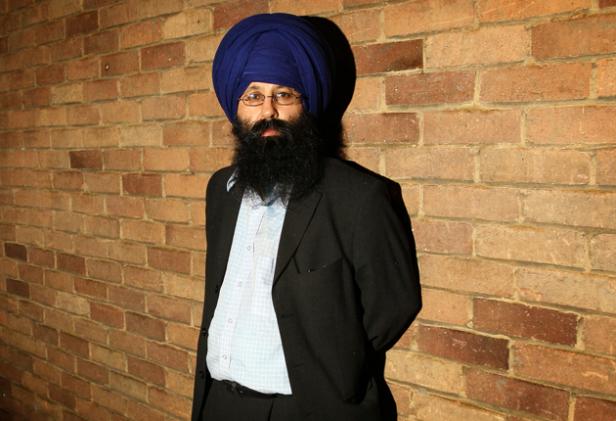 Statements like the one above, has made Jagdeesh Singh (pictured) a controversial figure within the suburbs of west London -home to many of Britain’s 400,000-plus Sikhs. While many young Sikhs consider Jagdeesh a role-model for the way he stands up and speaks against parochial traditions, many older and more conservative members of the community believe he is a troublemaker “who needlessly provokes controversy by shining an unwelcome spotlight on things that should not be aired in public”.
Statements like the one above, has made Jagdeesh Singh (pictured) a controversial figure within the suburbs of west London -home to many of Britain’s 400,000-plus Sikhs. While many young Sikhs consider Jagdeesh a role-model for the way he stands up and speaks against parochial traditions, many older and more conservative members of the community believe he is a troublemaker “who needlessly provokes controversy by shining an unwelcome spotlight on things that should not be aired in public”.
Eleven years ago, on 15 December 1998, Surjit Athwal disappeared during a holiday in the Indian Punjab with her in-laws. The 27-year-old customs officer at Heathrow had been desperately unhappy in her 10-year marriage to her husband Sukdave and had found love in the arms of another man. After years of abuse, she finally plucked up enough courage to seek a divorce but was persuaded by her domineering mother-in-law Bachan to travel to the Punjab for a family wedding in what she thought would be a final act of reconciliation. Instead, she was lured to her death. It took Jagdeesh Singh years to persuade the police to investigate his sister’s disappearance properly, and many more years of painstaking detective work to encourage one of the Athwal family members to testify. Finally, nine years after Surjit disappeared, Sukdave and Bachan Athwal were found guilty of ordering her death at a family council meeting. [link]
A charity based in Southall, called the Drug and Alcohol Action Programme (DAAP) will be joining forces with local Gurdwaras to address high rates of alcohol abuse taking place at Asian, particularly Punjabi Sikh, weddings. Perminder Dhillon, CEO of the charity states that “it is no longer acceptable to ignore the dangerous levels of alcohol drinking at these events.”
There is a mistaken view in Asian communities that religious and cultural backgrounds act as a barrier to the kind of drunken scenes so often seen in so many town centres all over the country. She said: “Many parents feel pressurized to provide a huge quantity of alcohol at weddings even if they themselves are non-drinkers”. [link]
She goes onto say that there are huge expectations on families to provide alcohol at weddings – often demanded by the groom’s side. This problem has become so extensive now that it is likened to demanding dowry and by partaking, “we end up supporting users with alcohol-related health problems during the binge-drinking period”.
Research published in the British Medical Journal suggests that men of South Asian origin in Britain are four times more likely to die of alcohol-related liver problems than other ethnic groups. Eighty percent of those South Asians who are vulnerable to alcohol-related mortality are Sikhs.
The charity has stated that the strategy they will use to combat this issue is simple – they will “name and shame” those involved and publicly condemn individuals on their website.
Almost two years ago I blogged about an NPR story that highlighted the issue of Runaway Grooms. Today, I once again write about the same issue – this time the media terms it “Holiday Brides” – a different name telling the same story. We should be outraged that years after we first heard about this issue, we are still having the same conversation. We are told that about 20,000 women have been deserted by men in the UK, US and Canada who promise to return to India and never do. The most recent questions is then, why are Punjabi women still falling for this obvious scam?
In a dusty village in the Jagraon district of Punjab, northern India, 35-year-old Suman (which is not her real name), lives with her widowed mother in a small room in a crumbling building. Four years ago, the secondary school teacher married a British man in a wedding arranged by relatives. Shortly after the ceremony, her husband, who is in his 50s, left for London with the promise he would send for her. At first all appeared to go well. “He would visit two to three times a year. “Whenever he came to India, we had a good time,” she said. However, on one visit he claimed her application for a spousal visa to the UK had been refused. It was like being a prostitute you take along and have a good time with and then leave behind ‘Suman’, 35 “He told me he had applied for an appeal. “But he has never shown me a copy of that appeal. He’s never shown me any documents.” The visits and calls ended, and for the past six months Suman has had no contact with her husband. “In hindsight, it was like being a prostitute you take along and have a good time with and then leave behind. [link]
 3 clicks are all it takes. JPMorgan Chase Bank partnered up with Facebook to have sort of an “American Idol” of charity giving. The 100 charities with the most votes by December 10th will receive $25,000.
3 clicks are all it takes. JPMorgan Chase Bank partnered up with Facebook to have sort of an “American Idol” of charity giving. The 100 charities with the most votes by December 10th will receive $25,000.
CLICK HERE to vote for the Jakara Movement.
There are a great number of Sikh charities that are participating. The Jakara Movement has the most votes for the Sikh groups – and needs your support to bring $25,000 to our community to support projects by the Sikh youth. This weekend alone, the Jakara Movement had 6 events. There were 5 camps, titled, “A Nation Never Forgets” that were hosted in Los Angeles, Turlock, Stockton, Yuba City, and Orange County. Here are some pictures from just one.
In the Bay Area, the Jakara Movement helped host the forum “Women and 1984”, bringing scholars and activists such as Cynthia Keppley Mahmood (author of Fighting for Faith and Nation and a champion for human rights), Navkiran Kaur Khalra (daughter of the late Shaheed for human rights, Jaswant Singh Khalra), and Jasmine Kaur (a human rights lawyer and member of ENSAAF).
To keep programs, like this going – WE NEED YOUR HELP. We are asking for ALL Sikhs – whether in the US, UK, Canada, India, Punjab, Malaysia, Australia, Africa, and beyond to rally around the Sikh organizations and provide your support. Get your non-Sikh friends to vote too!
Log into Facebook and click HERE to vote for the JAKARA MOVEMENT. And with your 20 votes, do not forget to vote for other great Sikh organizations (ENSAAF, SALDEF, and many others) too. Inspire and be inspired; together, we are the movement.
Please forward and circulate this widely. We Need the Entire Community to Rally Behind the Sikh Youth!
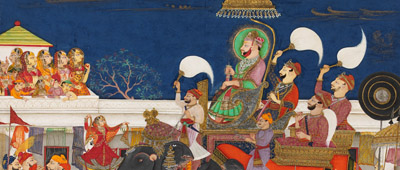 Guest Blogged by: Harinder Singh
Guest Blogged by: Harinder Singh
Last week I walked into the first exhibition to “comprehensively” explore the extraordinarily rich culture of the maharajas. “Maharaja – the splendor of India’s Royal Courts” is the feature exhibit at the Victoria & Alberta Museum in London and will be available through mid-January 2010. It was Susan Stronge, senior curator at V&A and friend of the Sikhs, who literally showed me the way to the V&A after a candid conversation over cafe latte about Sikhs, art, Orientalism, Barak Hussein Obama and Patwant Singh (late transnational Sikh ambassador). Her interest in my take on the Indian Maharaja’s depiction became the unusual catalyst to see the exhibition through two lenses: that of a Sikh and a South Asian.
Given that the number five in the Hindu numerology spans around business, marriage and romance, the five zones of exhibitions made sense. How the British have harbored such romantic notions of arbitrary boundaries of marriage and power in what it termed India! My journey through the exhibition started with the “Royal Spectacle” followed by the “Kingship in India.” It solidified with the “Shifting Power” that legitimized “The Raj’ which divided its subjects into “Princely India.” The only thing missing were the people, today’s South Asians.
20,000 Butchered in Delhi
25,000 Made “Disappeared” in Punjab
A Community Bruised
A Diaspora Tarnished
STILL WE RISE
A Nation Never Forgets
Remember 1984
On The Langar Hall, the fight for justice is rarely far from our minds. While justice remains elusive and mass-murderers promoted, the community suffers, but not in silence. In this 25th year of the Indian Government-sponsored pogroms, we bear witness to that genocide. We remember not only the lives lost, but call for accountability so that events such as Delhi 1984, Gujarat 2002, and the numerous human rights abuses that occur everyday in the territory that is India are not forgotten. The Indian elite may see the country as a rising economic star, but without political rights, freedoms, and a genuine commitment to justice, slogans such as “Indian Shining” fall on deaf ears.
Here is one such event that inspires us to remember:

Below the fold, see a list of upcoming events in your community. Participate, contribute, stand in solidarity – Remember 1984.
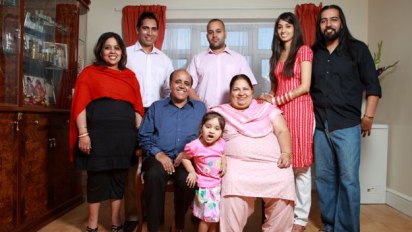 Guess what a British Asian family is hitting the reality TV scene … “Meet The Grewals” will begin filming 24/7 on November 4th in the UK. The three-generation family will be filmed for over eight weeks. Their lives will be aired as part of the iconic series, The Family, on Channel 4.
Guess what a British Asian family is hitting the reality TV scene … “Meet The Grewals” will begin filming 24/7 on November 4th in the UK. The three-generation family will be filmed for over eight weeks. Their lives will be aired as part of the iconic series, The Family, on Channel 4.
Director David Clews says: “I think the film captures both the big issues and the intimate moments of family life and I hope everyone will enjoy spending time with the Grewals in the same way I have.”
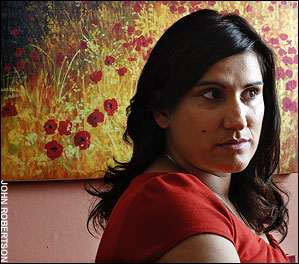 Although I can think of one commenter that may be angered, but Jasvinder Sanghera has just honored with the “Pride of Britain” award for her pioneering work.
Although I can think of one commenter that may be angered, but Jasvinder Sanghera has just honored with the “Pride of Britain” award for her pioneering work.
44-year-old Sanghera was instrumental in forcing the British government to take effective steps against forced marriages. The Foreign and Commonwealth Office now has a Forced Marriage Unit (FMU) which receives about 5,000 calls a year from victims. About 65 per cent of the cases the Unit deals with are Pakistani Muslims, 30 per cent are minors and 15 per cent are boys or men. Every year, the Unit helps bring back to Britain about 400 people trapped in forced marriages overseas.[link]
Gurmeal Singh, the British Sikh police officer who was humiliated for practicing Sikhi, will be compensated for “indirect harassment” and humiliation. Judge Murray Creevy ruled that the Greater Manchester Police (GMP) viola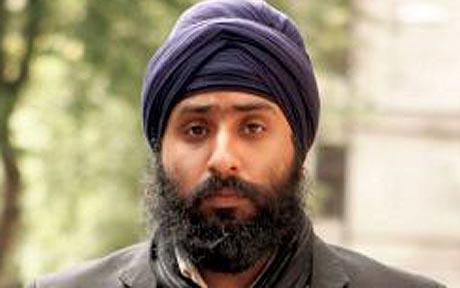 ted his dignity.
ted his dignity.
The BBC reports that the Assistant Chief Officer at GMP, Julia Rogers felt that they had always acted in the best interest of Singh. However, GMP accepts the ruling and has already updated their policies.
After a heated conversation with his Sergeant about his inability to remove his turban while on the job, Singh feared that he would be made to look like a comic character on television by wearing a modified turban.
Ultimately the ruling according to Singh’s lawyer:
“… leaves him in difficulty in relation to his future career but will hopefully open the eyes of Greater Manchester Police. He joined the police because of his values as a Sikh. What is important now is what Greater Manchester Police will do to help him come back.”
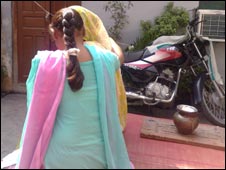 One of our goals on The Langar Hall is to raise awareness about issues affecting our community around the globe. Whether or not we identify or relate to these specific issues may not be as important as much as the acknowledgement that these issues do occur and that individuals and families and even children are affected. We hope that by raising awareness we can begin, as a community, to stand up against injustice in all its forms.
One of our goals on The Langar Hall is to raise awareness about issues affecting our community around the globe. Whether or not we identify or relate to these specific issues may not be as important as much as the acknowledgement that these issues do occur and that individuals and families and even children are affected. We hope that by raising awareness we can begin, as a community, to stand up against injustice in all its forms.
A recent article from the BBC reports that, according to campaigners in Punjab, British Asians are hiring contract killers to carry out up to 100 murders in India each year. One of the most well known cases is that of Surjit Athwal, a British Sikh woman who disappeared in Punjab in 1998. Eventually it was revealed that she had been murdered in a so-called honor killing after her in-laws discovered that she planned to divorce her husband. They had hired criminals in India to kill her. She was strangled and her body dumped in a river. Her brother, Jagdeesh Singh, now campaigns for other victims’ families.
“I think Surjit’s case exposed for the first time in this country overseas outsourced killings. How the Punjabi community, settled in Britain, send their females back to the land of origin, in the full knowledge that they can have them murdered easily, swiftly and efficiently.” [link]


